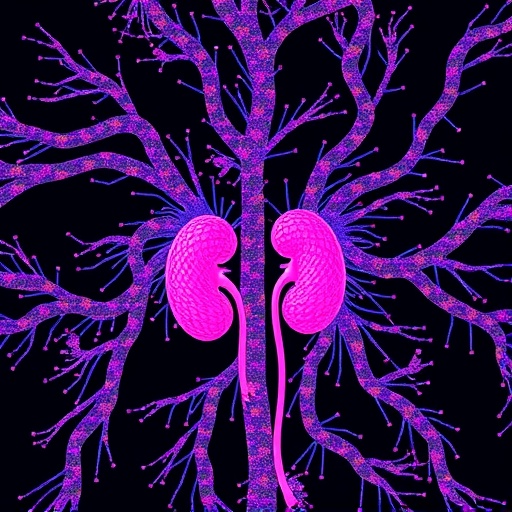In an era where precision medicine is rapidly evolving, the classification of rare cancers remains a formidable challenge, limiting advancements in diagnosis and tailored therapies. A groundbreaking study published in Nature Communications now reveals a transformative approach to this problem, focusing on rare kidney cancers — a category notorious for its heterogeneity and diagnostic complexity. The research, led by Jikuya, Johnson, Muraoka, and their colleagues, introduces a comprehensive comparative transcriptome atlas designed to act as an assistive tool in the complex classification of these uncommon malignancies.
The core innovation of this study lies in the construction and utilization of a massive, integrative transcriptome atlas. By analyzing and comparing the gene expression profiles across a spectrum of kidney cancer subtypes, the researchers harnessed the power of high-throughput sequencing technologies, enabling an unprecedented resolution in distinguishing subtle molecular differences. Their approach moves beyond traditional histopathological methods, which often fail to capture the nuanced genetic landscape that defines many rare tumors.
Rare kidney cancers present a unique diagnostic predicament due to their overlapping morphological features and scarcity of well-characterized biomarkers. The novel atlas developed here compiles an extensive range of transcriptomic data points, sourced from multiple patient cohorts, normal kidney tissues, and diverse molecular subtypes. This robust dataset empowers clinicians and researchers with a reference that pinpoints gene expression signatures specific to particular rare kidney cancer entities, allowing for much sharper classification accuracy.
Importantly, the researchers employed advanced bioinformatics pipelines and machine learning algorithms to distill actionable insights from this vast ocean of data. These computational methods enabled the identification of distinct molecular patterns and signature genes that demarcate individual cancer types with remarkable precision. The integration of such AI-driven analysis catapults the diagnostic process towards objectivity, reproducibility, and automation — key hurdles in rare cancer pathology.
The study’s implications stretch far beyond mere classification. By clearly defining the transcriptomic identity of these tumors, it opens new avenues for targeted therapeutic development. Since rare cancers often lack effective treatment options due to minimal understanding at the molecular level, the ability to characterize their biology comprehensively is a crucial step forward. This atlas not only enhances our grasp of cancer biology but may also serve as a foundational tool for drug discovery focused on molecular vulnerabilities unique to these tumors.
A striking aspect of the reported atlas is its comparative nature. Instead of analyzing each tumor subtype in isolation, the comparative framework allows for a side-by-side evaluation of similarities and differences between cancer subtypes. This strategy helps uncover shared pathways that might be exploited by broad-spectrum therapies, as well as unique mechanisms that could inform precision-targeted interventions for specific subgroups within the rare kidney cancer spectrum.
The team’s methodology incorporated rigorous validation using independent patient samples and multiple sequencing platforms to ensure the results’ robustness and reproducibility. Such meticulous cross-validation consolidates confidence in the predictive power of the transcriptome atlas, positioning it as a potentially game-changing clinical decision-support tool. The landscape of rare kidney cancer diagnosis could be reshaped as clinicians gain access to an evidence-backed, genomic-driven framework to guide treatment planning.
Moreover, the atlas offers an accessible platform that integrates seamlessly with existing clinical workflows. By translating complex transcriptomic data into interpretable diagnostic outputs, the system empowers pathologists and oncologists who may not have extensive genomics expertise. This democratization of cutting-edge molecular diagnostics holds promise for improving patient outcomes by enabling timely, accurate cancer subtype stratification — a prerequisite for personalized medicine approaches.
The research team also highlighted how their comparative atlas could facilitate future research, including the exploration of tumor evolution and heterogeneity within rare kidney cancers. Longitudinal studies can leverage this resource to track molecular changes over time and under treatment pressure, shedding light on mechanisms of resistance or progression. Such insights would be invaluable for devising adaptive therapeutic strategies that anticipate tumor dynamics and improve long-term patient survival.
From a computational biology perspective, the study stands as a testament to the power of integrative multi-omic data analysis fused with artificial intelligence. The interdisciplinary collaboration between oncologists, molecular biologists, and data scientists exemplifies the modern blueprint for tackling complex biomedical challenges. By fostering such synergies and sharing their analytical pipelines openly, the researchers set the stage for future enhancements and broader applications in oncology.
In addition, the approach outlined in this study is not limited to kidney cancers alone. The framework and tools could conceivably be adapted to other rare tumor types where diagnostic ambiguity hinders effective management. This versatility underscores the atlas’s potential as a versatile platform to mitigate one of oncology’s greatest bottlenecks — the characterization of rare malignancies with limited molecular data.
In conclusion, this landmark study redefines the possibilities for rare kidney cancer diagnostics through an innovative transcriptome atlas that combines large-scale comparative data with cutting-edge computational methodologies. This research heralds a new frontier in molecular pathology, promising to accelerate the identification, classification, and ultimately treatment personalization for patients afflicted by these elusive cancers. As the medical community embraces such technological advancements, the long-standing challenge posed by rare tumors may find resolution through the power of comprehensive molecular insights and machine learning.
Subject of Research: The study focuses on the development of a comparative transcriptome atlas for the enhanced classification of rare kidney cancers, leveraging transcriptomic data to improve diagnostic precision and inform targeted therapeutic strategies.
Article Title: Comparative transcriptome atlas as an assistive modality for complex classification of rare kidney cancers
Article References:
Jikuya, R., Johnson, T.A., Muraoka, E. et al. Comparative transcriptome atlas as an assistive modality for complex classification of rare kidney cancers. Nat Commun 16, 10340 (2025). https://doi.org/10.1038/s41467-025-65303-z
Image Credits: AI Generated
DOI: https://doi.org/10.1038/s41467-025-65303-z




